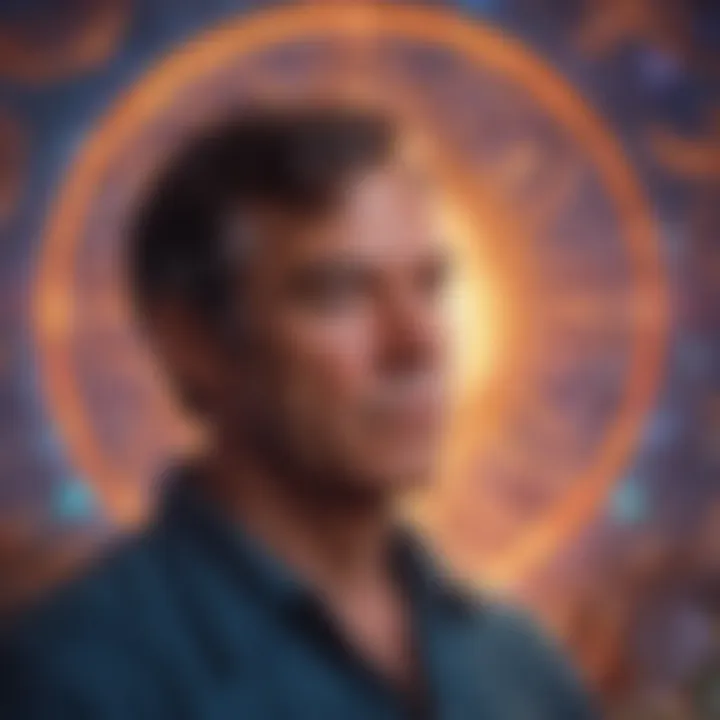Joseph Campbell's Influence in The Power of Myth


Intro
Joseph Campbell's The Power of Myth presents a lens through which we can grasp the intricate weave of narrative across cultures and epochs. His insights delve into the heart of storytelling, revealing not merely tales but frameworks of understanding human existence. This text traverses the depths of adventure, heroism, and transformation that resonate throughout history. As we unpack Campbell's work, we uncover not just the essence of myth but also how it shapes our very identity and worldview.
Campbell's argument is that myths are not relics of the past; they are alive and breathing in our everyday lives. They inform our values, perceptions, and interpersonal connections in ways that are both subtle and profound. The stories we tell create pathways for meaning and provide context for our struggles and triumphs.
The journey through The Power of Myth is not just an academic pursuit; it's an invitation to contemplate the foundational narratives that guide our lives and cultures today. Throughout this exploration, we highlight key themes that Campbell presents, each laden with insight and relevance.
Preamble to Joseph Campbell
Joseph Campbell stands as a towering figure in the landscape of mythology and literature. Born in 1904, his work redefined our understanding of myth and its place in human culture. Campbell's insights are particularly relevant today, providing a framework through which we can view not only the stories that shape our identities but also the underlying universal patterns that govern human experience. By examining Campbell's life and thought, readers can gain a richer understanding of the societal and personal influences that myths exert on us.
This section will explore Campbell's biographical context and intellectual influences, setting the stage for a deeper appreciation of his seminal work, The Power of Myth. By navigating through his early life and the intellectual currents that shaped his ideas, one can see how these elements converge to shed light on the intricate relationship between mythology and modern society.
Biographical Context
Joseph Campbell's journey into the world of mythology began in New York City, where he was born and raised. Early on, he nurtured a passion for storytelling and art, elements deeply woven into the fabric of his identity. This passion, however, was met with challenges as he encountered the rigid academic structures of his time. After earning his degree from Columbia University in 1925, Campbell traveled to Europe, where he immersed himself in various cultures, broadening his understanding of mythological traditions.
The hardships he faced during his upbringing, including his struggle with feelings of isolation and his father's strict adherence to traditional values, significantly shaped his worldview. Campbell observed how mythology acted as both a mirror and a beacon for diverse societies, pointing out shared human experiences. His experiences and the wisdom he gathered not only formed the bedrock of his theories but also ignited a lifelong exploration of human connection through myth.
Intellectual Influences
Joseph Campbell was not a thinker working in isolation; rather, he drew upon a rich tapestry of intellectual influences that propelled his ideas. Among these influences was the philosophy of Carl Jung, particularly the emphasis on archetypes, collective unconsciousness, and the symbolism present in myths. Campbell adopted Jung's theories as a lens to view the narratives that populate cultures across the globe.
Another critical influence was the work of James Joyce, especially in his exploration of narrative form and its role in understanding personal and societal identity. Joyce’s innovative storytelling techniques resonated with Campbell, encouraging him to experiment in his own narrative constructs.
Furthermore, the anthropology of cultures and the cross-cultural research he undertook were instrumental in shaping his perspective. The notion that myths are not merely relics of the past but living narratives that inform our present continues to be a primary theme in Campbell’s work. This perception allows for a dynamic interaction between ancient stories and contemporary life, suggesting that myths continue to hold relevance in guiding our moral and ethical choices.
Understanding The Power of Myth
Joseph Campbell's The Power of Myth is more than just a collection of observations about ancient stories. It acts like a cultural mirror, reflecting the values, struggles, and aspirations of humanity across time and geography. This section aims to unpack the significance of Campbell's exploration, shedding light on vital elements such as how myths serve as navigational beacons in our lives, their role in shaping collective experiences, and their continuing relevance in today's fast-paced world.
Overview of the Work
In this particular work, Campbell distills complex ideas surrounding myths into digestible insights, revealing how they are intrinsically woven into the fabric of human existence. He argues that myths endure because they speak to universal human experiences—birth, love, death, and transformation. The idea is that these stories transcend cultural differences, presenting archetypal themes that resonate with our own lives.
For example, every culture has a hero's story, though the details may differ. From Odysseus in Ancient Greece to Harry Potter in modern literature, the journey of the hero serving a greater purpose remains a defining aspect of human storytelling. Campbell also points out that while the contexts may vary, the emotional truths shared in these stories endure, connecting past and present generations.
Historical Context of Myths
Understanding The Power of Myth necessitates an awareness of the historical context surrounding various myths. Mythology does not exist in a vacuum; it grows from the soil of its time. Thus, stories arise in response to social structures, cultural conflicts, and existential questions.
Consider the myths from ancient civilizations like the Egyptians, who created intricate tales surrounding their gods and the afterlife, revealing their cultural values. These stories served as both a way to rationalize the unexplainable and to bind the community under shared beliefs.
Similarly, Native American mythologies often highlight the relationship between humans and nature. These narratives are not merely fables; they are woven into the environmental practices and spiritual beliefs of the tribes, illuminating a worldview that cherishes interconnectedness with the earth rather than exploitation.
Campbell’s work thus invites readers to think critically about the origins and functions of myths in society. It’s not just about recounting tales; it’s about understanding the lens through which different cultures view life and existence. This historical layering adds depth to Campbell’s ideas, encouraging readers to see myths as evolving narratives rather than static proclamations of truth.
"Myths are public dreams; dreams are private myths."


This exploration emphasis how folklore and historical narratives continue to hold their ground even amidst societal changes.
In summary, the significance of understanding The Power of Myth lies not only in enjoying mythological tales but in unraveling their profound impacts. Myths are crucial in educational frameworks, cultural identity, and personal growth, offering clues to navigate the often tumultuous waters of modern life.
Key Themes in Campbell's Work
Joseph Campbell's exploration of mythology uncovers several key themes that not only enrich the understanding of myths themselves but also reflect upon human experience as a whole. In fact, Campbell's arguments draw on the universality of mythic elements, revealing how these ancient narratives continue to resonate in modern society. Through the lenses of the Hero's Journey and the role of archetypes, one can glean insights into shared human experiences, personal evolution, and cultural connections. These themes serve as a backbone for comprehending the intricate tapestry of myth and its relevance to contemporary life.
The Hero's Journey
Stages of the Hero's Journey
The Hero's Journey, perhaps one of Campbell's most monumental contributions to the realm of storytelling, illustrates a set of stages that an archetypal hero typically undergoes. The journey begins with a call to adventure, where the hero is beckoned into the unknown, leading to a transformative crisis that shapes their identity. This outline is not just a narrative framework; it is a reflection of human resilience and metamorphosis.
A key characteristic of the stages lies in their cyclic nature, portraying life as a series of challenges, growth experiences, and revelations. They resonate strongly with readers and viewers because they reveal a truth about life—that challenges are both inevitable and necessary. A unique feature of these stages is their flexibility. They can be adapted and used across countless stories in various media, from ancient epics to modern films.
However, while this model is beneficial for understanding narratives and personal development, it also risks oversimplifying complex characters and stories, leading to predictable plotlines.
Examples in Literature and Film
When one examines examples of the Hero's Journey in literature and film, it becomes clear just how pervasive Campbell's model is within storytelling. Iconic figures like Harry Potter in J.K. Rowling’s series showcase the hero's transformation from an ordinary boy to a pivotal figure in a grand battle against darkness. Similarly, Katniss Everdeen, the protagonist in Suzanne Collins’ The Hunger Games, embodies the stages of the Hero’s Journey as she rises from a troubled background to become a symbol of resistance.
The strength of these examples lies in their relatability; they echo personal struggles and aspirations that many face in their own lives. They illustrate that heroes aren't always born out of greatness, but often emerge from ordinary circumstances shaped by extraordinary trials. The downside, though, is that reliance on such a formula can stifle originality in storytelling, as creators might feel compelled to fit their narratives within these established structures.
The Role of Archetypes
Definition of Archetypes
Campbell introduces the concept of archetypes as universal symbols and images present in myths across cultures. These archetypes serve as recognizable figures—like the Wise Old Man or the Mother—conveying essential human experiences that transcend time and space. They reflect fundamental psychological patterns and evoke emotional responses due to their sheer familiarity.
The strength of this definition lies in its ability to connect disparate cultures through common themes, reinforcing the idea that despite varying traditions and stories, certain fundamental human experiences unify us all. One unique feature is the adaptability of archetypes; they can be viewed through different lenses, revealing deeper or alternative meanings depending on the context. However, there also exists a risk of misinterpretation, where these archetypes could be oversimplified or stereotyped, losing their intended depth and complexity.
Archetypes Across Cultures
Exploring archetypes across cultures illustrates how deeply intertwined our narratives can be, despite geographical or temporal distances. For example, the concept of the Hero appears in numerous forms worldwide—whether it's the tales of Achilles in ancient Greece or the legends of King Arthur in medieval Britain, the essence remains. This commonality underscores how core human themes—like bravery, loss, and redemption—are echoed through diverse cultural lenses.
This cross-cultural perspective enhances our understanding of shared values and collective human experience. While examining differences in the manifestation of these archetypes can enrich our comprehension of specific cultures, it may also introduce challenges in accurately portraying complex narratives without falling into the pit of cultural generalization. This conversation prompts us to consider the delicate balance required when drawing parallels and connections among various traditions.
"Myth is much more than a story to be told; it is a fundamental experience of being human."
Mythology and Society
Mythology serves as a bridge connecting humanity’s past with its present. It is not just a collection of stories or symbols; it embodies the shared experiences, values, and belief systems that define cultures. By examining mythology in the framework of society, we discern how these narratives influence behavior, social norms, and interpersonal relationships. They help us navigate the complexities of existence, offering insights into human nature and communal identity. In a world that often feels fragmented, mythology provides a coherent narrative that resonates across generations.
Myth's Influence on Culture
Shared Values and Beliefs
When we delve into shared values and beliefs, we find that myths carry the hopes, fears, and aspirations of a culture. They instill a sense of belonging, knitting individuals together into a collective identity. A notable characteristic of these shared myths is their universality; they touch upon themes such as heroism, love, and sacrifice, resonating across various cultures.
The benefit of incorporating shared values in this discourse lies in their ability to foster understanding. For instance, the tales of touching sacrifices for the greater good can be found in countless narratives from different traditions. This not only highlights similarities among cultures but also enriches our comprehension of what drives human action.


However, the uniqueness of these myths can sometimes become a double-edged sword. Relying too heavily on one narrative can risk overshadowing other perspectives, potentially leading to cultural insensitivity or homogenization. Thus, while they serve as foundational touchstones, we must approach them critically and inclusively.
Myth in Contemporary Society
In contemporary society, myths continue to shape collective consciousness. Media, literature, and the arts regularly incorporate mythological elements, revitalizing them for modern audiences. A central characteristic is their adaptability; contemporary interpretations often reflect current issues, addressing subjects such as identity, conflict, and societal change. This makes them not just relevant but crucial in understanding present social dynamics.
Another intriguing aspect of myth today is its role in social commentary. Myths like the tragedy of Icarus can symbolize the perils of ambition unchecked by wisdom; thus, they resonate deeply in a society that values success yet grapples with the consequences of recklessness. These narratives provide both critique and guidance, directing us to reflect on our paths.
Yet, one downside is the risk of over-simplification when ancient myths are adopted and repackaged. Context can easily be lost, stripping the stories of nuances that give them depth. Engaging with these myths requires a balance—celebrating their legacy while also interrogating their relevance and applicability in our intricate modern world.
Storytelling as a Cultural Tool
Preserving History Through Myth
Myths serve as vessels for history, conveying lessons and experiences from generations past. A distinctive quality of myths in this context is their narrative structure. Carried through oral traditions, they evolve but remain anchored in the core values of the time. Mythical narratives, whether through epic poems, folk tales, or modern writings, preserve the essence of societies.
The merit of preserving history this way is both practical and philosophical. On one hand, it safeguards essential cultural memories, allowing societies to learn from the past. On the other hand, these myths often embody moral teachings, shaping ethical frameworks and social conduct.
However, this preservation isn’t always straightforward. The possibility of distortion exists; as stories are retold, they can be altered or romanticized, overshadowing original truths. Therefore, while they are valuable tools, we must navigate their narratives carefully, weighing the authenticity of the tales against their altered forms over time.
Narrative Techniques in Various Cultures
Diving into narrative techniques across cultures reveals a treasure trove of storytelling richness. Each tradition utilizes specific styles, structures, and devices that reflect its unique worldview. For instance, Indigenous practices often employ cyclical storytelling, representing the interconnectedness of time and existence, while Western styles might favor linear progressions. This characteristic points to the diversity in how societies interpret and convey myths.
The advantage of exploring these techniques lies in the cross-pollination of ideas. When cultures share their stories, they open pathways for dialogue and understanding. Take the concept of the trickster figure; it exists in numerous forms worldwide, highlighting a universal human trait. The study of narrative techniques thus enhances appreciation of different cultures, fostering empathy and insight.
Yet, homogenizing these techniques risks losing the distinct voice of each culture’s storytelling. A nuanced understanding is essential to appreciate and honor the uniqueness of these narratives, avoiding a one-size-fits-all approach. As we analyze these diverse techniques, we must remain mindful of their origins and implications.
"Through myth and storytelling, society not just reflects its values but actively shapes its identity. Every tale we share weaves the fabric of who we are together."
Consequently, mythology is not just an artifact of the past but a living dialogue that continues to evolve, informing the present and inspiring future generations.
Personal Reflection and Myth
Personal reflection on myth plays a crucial role in understanding how narratives shape our identities and experiences. The essence of Campbell's ideas lies in the fact that myth isn't just a relic of the past but a living part of our cultural fabric. Here, we dive into how myths can be both mirrors and windows – reflecting personal truths while also offering views into collective human experiences. This section will break down the application of myths in personal growth and explore their transformative power.
Application in Personal Growth
Finding Meaning in Myths
Finding meaning in myths provides individuals with a framework to navigate life's complexities. Often, when faced with uncertainty or adversity, people look to stories that resonate with their struggles. Myths contain essential truths and archetypical characters that embody the trials and tribulations faced in everyday life. One key characteristic of this aspect is that myths hold universal themes that can resonate deeply on a personal level.
- Key Characteristic: Myths encapsulate profound lessons about life, love, and loss, attracting individuals seeking understanding.
The unique feature of this approach is its ability to foster a sense of belonging and connection. Myths remind us that we are part of something larger than ourselves, bridging personal experiences with cultural heritage. While some may argue myths are outdated, in reality, they offer timeless wisdom and insights instantaneously relevant to modern challenges.
For instance, one might find comfort in the story of Persephone, navigating a journey of despair and renewal, symbolizing seasonal cycles and personal transformation. Such stories create connections and spark poignant reflections about the struggles we experience.
Myth as a Tool for Self-Discovery
Using myths as tools for self-discovery opens avenues for introspection. Individuals often recount myths from their cultural backgrounds, which help them to define their values and identity. This aspect is significant because it channels personal histories through the lens of collective narratives.


- Key Characteristic: These stories help individuals contemplate who they are and where they come from, often springboarding them into deeper inquiries about their life purpose.
The unique feature lies in its capacity to elicit revelations about inner strengths and weaknesses. Myths encourage an exploration of one's psyche, extracting lessons that one might apply to personal journeys, thus guiding self-growth.
With the rich tapestry of myths available, individuals can engage with their inner narratives, illuminating pathways to self-exploration. However, reliance on myths can sometimes lead to disillusionment, particularly when the tales don't align with personal realities. Nevertheless, the shared wisdom contained in these narratives enables one to embrace their nuances while promoting self-awareness.
Transformative Power of Myths
The transformative power of myths transcends their origins; it lies in their ability to shift perceptions and inspire action. Myths encourage personal and societal change by addressing fundamental human experiences. They serve as catalysts for growth, enabling individuals to see beyond their confined worldviews. By articulating complex emotions and embodying challenges in story form, myths offer tools for understanding and confronting life's adversities.
"Myths are public dreams; dreams are private myths."
— Joseph Campbell
Overall, myths indeed stimulate personal development, inviting individuals into a dialogue with history, culture, and their very essence. They are not just stories but are foundational blueprints for growth, resilience, and understanding the self in relation to the greater whole.
Critiques of Campbell's Theories
Engaging with Joseph Campbell's work, particularly in The Power of Myth, prompts a litany of responses, and it's vital to address the critiques surrounding his theories. This is not merely a side note; it is an essential component that amplifies our understanding of mythology's role in culture. Examining these critiques enables a more nuanced appreciation of Campbell's contributions while also acknowledging the complexity and potential misapplications of his ideas. The criticisms not only fuel academic discourse but also contribute to the evolving narrative surrounding mythology itself.
Scholarly Criticism
Scholarly critiques of Campbell's theories often stem from a variety of perspectives. Some scholars propose that Campbell's ideas about the Hero's Journey, while insightful, are overly simplistic. They argue that by reducing diverse cultures to a universal narrative structure, Campbell risks homogenizing distinct narratives and practices. For instance, while the Hero’s Journey is a useful framework for understanding some stories, it doesn’t always fit into the complexities of every myth. Different cultures have unique ways of storytelling that don't conform to this pattern, and insisting on a singular archetype can undermine these rich traditions.
Critics also highlight Campbell's reliance on psychological concepts sourced from Carl Jung. Some assert that excessive reliance on Jungian archetypes can lead to an interpretive lens that diminishes the sociocultural contexts of myths. Campbell’s perspective may be seen to prioritize psychological over communal or historical aspects, which limits a comprehensive understanding of why these stories emerged in the first place. The critiques remind us that while there are universal aspects of mythology, the local variations often tell more about a culture than any overarching theory can capture.
Cultural Appropriation Considerations
Another significant critique comes from the discussions surrounding cultural appropriation. When Campbell examined various myths and religions, his analyses sometimes lacked a critical engagement with the contexts from which these stories originated. For some, this can be seen as a form of appropriation, where the depth and significance of traditional narratives are stripped away to cater to a Western audience. His broad strokes approach may be viewed as negating the authenticity and originality of the specific cultures involved.
The notion that myths can be universally applicable might inadvertently promote a perception that all stories hold the same validity in diverse contexts. This can result in a dilution of cultural significance, as certain stories may resonate deeply within specific communities but become mere archetypes when shared outside their context.
"One must tread carefully when drawing parallels across cultures, as the nuances within each mythology speak to a people's soul, history, and identity."
Engaging with Campbell's work through the lens of cultural sensitivity encourages readers to grapple with the ethical implications of studying mythology. Recognizing the implications of cultural borrowing leads to a more respectful and responsible approach to understanding myths, emphasizing the importance of context and heritage. This also opens the door for richer dialogues between cultures rather than reducing them to similar patterns, which can dilute their unique essence.
In sum, the critiques of Campbell’s theories serve as a reminder that while his insights into the functioning of myths are significant, they must be integrated into a broader discussion that respects and understands the diverse cultural tapestries from which these stories are woven.
Ending
Understanding the role of myth in our lives is not just an academic pursuit; it opens up a window into the human experience itself. In the sweeping narrative of human culture, myths serve as a bridge between the past and present, guiding us through the tumultuous waters of existence. Campbell masterfully reaffirms the timeless relevance of myth in confronting issues we face daily, whether they stem from personal struggles or communal challenges.
The Enduring Relevance of Myth
Myths are not simply relics of bygone eras; they are living entities that resonate with contemporary society. They encapsulate the emotional truths of human existence, reflecting our hopes, fears, and aspirations. For instance, the archetype of the hero, found throughout mythology, speaks to universal themes of courage and resilience. This resonance becomes even more evident in stories today, from blockbuster films to literature, where these age-old patterns reemerge, capturing the imagination of audiences worldwide.
"Myths are clues to the spiritual potentialities of the human life." — Joseph Campbell
Cultures may change, but the essence of our struggles often remains. Today’s young adults navigate a landscape filled with rapid changes, uncertainties, and shifting values. In this context, myth offers not just comfort but a structure that can help make sense of confusing realities.
Future Directions in Mythology Studies
As we look toward the future, the study of mythology is evolving. Academia is beginning to embrace interdisciplinary approaches, combining insights from psychology, anthropology, and narrative theory. For example, emerging fields such as digital humanities explore how myths can be represented and shared through technology, like virtual reality or digital storytelling. This could pave the way for new interpretations that reflect modern dilemmas and experiences.
Furthermore, there is a growing appreciation for the importance of local myths in understanding cultural identity and community resilience. Delving deeper into lesser-known narratives can shed light on unique regional identities that often go overlooked in mainstream discussions of mythology.
In essence, the future of mythology studies may not only focus on traditional narratives but also expand to include contemporary myth-making — exploring how current cultural phenomena can become the myths of tomorrow. This exploration can serve to bridge generational divides and foster a richer understanding of humanity.
By continually revisiting and reshaping our understanding of myths, we can ensure their relevance persists, providing guidance and wisdom for generations to come.















